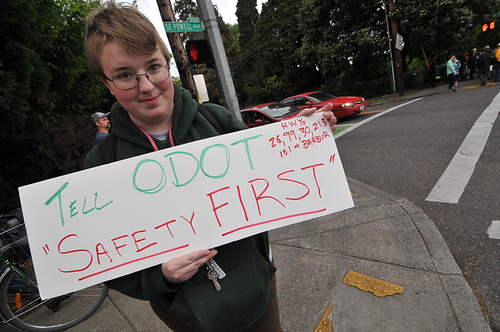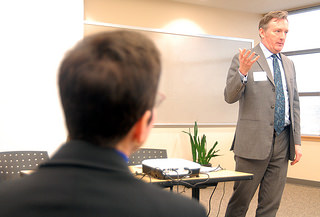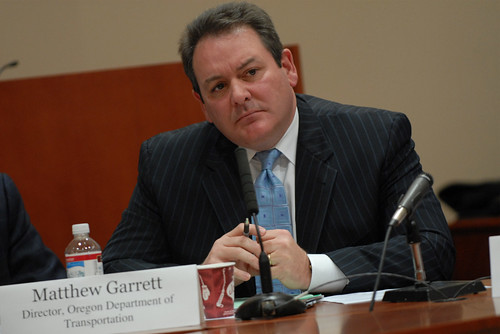Apparently this is what happens when an elected official doesn’t have to play nice any more.
Former two-term Metro President David Bragdon launched a politely spoken but blistering attack on the Oregon Department of Transportation Friday, urging his former state to reform its transportation system in response to “incompetence or dishonesty at the highest levels of ODOT,” among other factors.
Bragdon, who left office in 2010 for a top planning job in New York City and now runs a nonprofit think tank called TransitCenter, spoke in a lunchtime address to the City Club of Portland. His prepared remarks focused on the need to change what he called “the insanity of Oregon’s transportation governance system” but his criticism of the department’s leadership deepened in off-the-cuff answers to questions afterward about the Columbia River Crossing.
“What there definitely is is a transportation governance and management problem. And that’s what needs to get fixed first. If it’s not fixed first, the other problems will persist.”
— David Bragdon on whether ODOT has a revenue problem
“Portland used to be leading the parade and figuring this stuff out, going against the grain,” Bragdon said. Now, he said, the region is “watching the parade go by.”
Though he acknowledged that the reasons for funding problems at both the state and city levels are “complicated,” he repeatedly singled out the state transportation agency as an institution that would need radical change before the problems could be fixed.
“The statement that Oregon has a transportation finance problem: I don’t know,” Bragdon said. “I don’t know how anybody would know. The agencies are so opaque. … What there definitely is is a transportation governance and management problem. And that’s what needs to get fixed first. If it’s not fixed first, the other problems will persist.”
Bragdon said that though there are “good people” at ODOT, they’ve failed to create good governance.
“If good people can’t make the system work, then you have to say, ‘There must be something wrong with the system,'” Bragdon said.
By arguing that ODOT needs major change before it gets any new revenue, Bragdon differed from the consensus of liberal politicians in Portland and the rest of Oregon.
“Unless you get the governance right, the decisions won’t be right and the money won’t be well-spent,” he said.
Advertisement
Bragdon calls out ODOT director Matt Garrett
Bragdon said ODOT’s problems had contributed to what he described as two major failures: the decision by legislators to kill a four-cent gas tax increase earlier this year, and the 2014 collapse of plans for a new Columbia River Crossing even after $200 million in taxes had been spent on it.
The transportation package failed for multiple reasons, he said, but “it didn’t help that the state transportation department had been promoting estimates of greenhouse gases that were wildly inaccurate,” Bragdon said.
“The ODOT director puffed himself up and said, ‘This is ours, this is ours, this is ours.’ And then all of a sudden it fell apart and then it’s everyone else’s responsibility.”
— David Bragdon on the Columbia River Crossing
ODOT had been falsely calculating that widening highways would reduce greenhouse gas emissions over the long run. After environmental watchdog organizations objected, ODOT Director Matt Garrett chalked it up to something resembling a mathematical error. Bragdon brushed that off as a face-saving excuse.
“It’s Oregon,” Bragdon said.
Bragdon again singled out Garrett as responsible for the Columbia River Crossing’s fatal series of “errors and inaccuracies and half-truths at best at the highest levels in Salem.”
“All of those are on ODOT,” Bragdon said. “The ODOT director puffed himself up and said, ‘This is ours, this is ours, this is ours.’ And then all of a sudden it fell apart and then it’s everyone else’s responsibility. … When you have $200 million spent and a failure of that magnitude, it really does behoove us to ask what happened.”
If the Washington Senate had signed off on the CRC deal in 2013, he said, the state DOTs would be asking for more money by now.
“ODOT and WSDOT would be back at their legislatures saying, ‘oh, well, we miscalculated, it’s going to be a little bit more.'” he said. “‘I know we told you that the federal government was going to be able to pay for it.’ … It would not be under construction today.”
Possible ODOT reforms: no more control of local streets, competitive grants to cities

(Photo © J.Maus/BikePortland)
Bragdon’s prescriptions for change at ODOT, he said, would be very difficult to execute but are “pretty simple” in nature.
He based his recommendations on recent reforms in California, Massachusetts, Pennsylvania and Greater London.
First, he said, the state should not be in the business of managing local roads.
The city of Milwaukie can’t have a stoplight on McLoughlin so people can get to the park across the street from their downtown because after all, that isn’t McLoughlin Boulevard, it’s a state highway,” Bragdon said. “Because people took McLoughlin from Portland to Salem 50 years ago, the people of Milwaukie can’t have a stoplight.”
“Because people took McLoughlin from Portland to Salem 50 years ago, the people of Milwaukie can’t have a stoplight.”
— David Bragdon on Oregon’s transportation status quo
Oregon’s confusing “mashup” of responsibilities for different streets prevents ordinary residents from knowing who they can hold accountable for problems, he said.
Second, Bragdon said ODOT needed to change its “totally random allocation for funding” various local jurisdictions.
“It has nothing to do with mileage, it has nothing to do with need, it has nothing to do with return on investment, it’s just sort of always been that way,” he said. “There shouldn’t be an annuity or a guarantee or an entitlement based on jursidictional ownership of the past.”
He compared the state’s transportation funding system to a system that would fund public education based on the decision of an executive running its university system.
“50 percent to universities, 30 percent to community colleges, 20 percent to K-12,” he joked.
The state, he said, can be a regulator of local government, a funder of local government or a direct provider of services, but it “can’t be all three at the same time.”
Bragdon closed his prepared remarks by invoking Oregon’s change of course to kill the planned Mount Hood Freeway in 1974.
“That didn’t just happen,” he said. “People cared about it.”
Some of the people who changed Portland’s direction in the 1970s, Bragdon said, were in the room on Friday. Others were the grandparents of people in the room.
“I expect a lot from you,” Bragdon told the crowd. “Don’t let me down.”
Here’s a video of the full speech and interview afterward:
— Michael Andersen, (503) 333-7824 – michael@bikeportland.org





